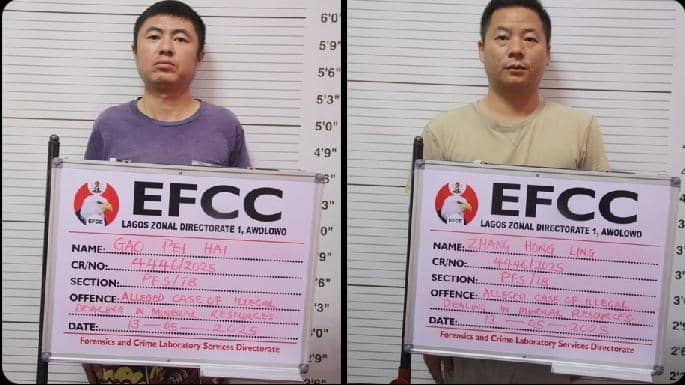The Economic and Financial Crimes Commission (EFCC) arraigned two Chinese nationals, Zhang Hong Lin and Gao Pei Hai, before Justice Chukwujekwu Aneke at the Federal High Court in Lagos on June 4, 2025. The duo faced a five-count charge, including conspiracy, illegal mining and unlawful possession of valuable mineral resources, such as lithium and copper ores, in a case that has spotlighted Nigeria’s ongoing battle against illicit resource extraction. A third suspect, Gao Pei Yu, remains at large, adding intrigue to the unfolding legal drama.
Details of the Charges and Court Proceedings
The EFCC alleges that in May 2025, Zhang and Gao conspired to defraud the Federal Government of Nigeria by engaging in unauthorized mining operations. The charges detail their involvement in extracting and possessing minerals, including Mica, Spodumene, Petalite, Bornite, and Cuprite—resources critical to industries like battery production and electronics. These minerals, particularly lithium, are in high global demand due to their use in renewable energy technologies, making illegal mining a lucrative but illicit enterprise. The EFCC further accused the defendants of attempting to export these minerals without proper authorization, a violation of Nigeria’s mining regulations designed to protect national resources and revenue.
The courtroom scene was charged with tension as the EFCC prosecutor, A.T. Kehinde, presented the case. The charges outlined how the defendants’ actions not only undermined Nigeria’s economic interests but also posed environmental risks, as unregulated mining often leads to land degradation and pollution. The prosecution emphasized that the illegal activities were conducted with deliberate intent to bypass regulatory oversight, depriving the government of due revenue from mineral exports.
When arraigned, both Zhang and Gao pleaded not guilty, setting the stage for a contentious legal battle. The EFCC requested that the defendants be remanded at the Nigerian Correctional Service (NCoS) facility pending trial. However, the defense counsel, Jeremiah Okoro, made a bold move by requesting that the defendants be held in EFCC custody instead, citing the need to prepare an oral bail application. Justice Aneke rejected this request, opting to remand Zhang and Gao at the Ikoyi Correctional Centre, a decision that underscored the seriousness of the charges. The court adjourned the case to July 4, 2025, for the trial to commence, leaving observers eager to see how the case will unfold.
This case shines a spotlight on Nigeria’s struggle to regulate its vast mineral wealth. The country is rich in resources like lithium, copper, and other critical minerals, which have attracted both legitimate investors and illicit operators. Illegal mining has long been a challenge, with foreign nationals and local collaborators often exploiting loopholes in enforcement. The EFCC’s action against Zhang and Gao signals a renewed commitment to tackling such activities, especially as Nigeria seeks to position itself as a key player in the global mineral market.
The involvement of Chinese nationals in this case also raises questions about foreign participation in Nigeria’s mining sector. China’s growing demand for minerals to fuel its industrial and technological ambitions has led to increased activities by Chinese firms and individuals in Africa. While many operate legally, cases like this highlight the risks of unregulated ventures. The EFCC’s pursuit of the third suspect, Gao Pei Yu, suggests that the investigation is far from over, and authorities are determined to dismantle any networks involved in illegal mining.
Environmentalists and local communities have also expressed concern about the impact of illegal mining. Unregulated operations often lead to deforestation, soil erosion, and water contamination, affecting the livelihoods of nearby residents. The minerals allegedly mined by the defendants—Mica, Spodumene, and others—are extracted through processes that, when poorly managed, can leave lasting ecological scars. This case could serve as a catalyst for stricter enforcement of environmental standards in Nigeria’s mining industry.
As the trial date approaches, all eyes will be on the Federal High Court in Lagos. Will the EFCC secure a conviction, sending a strong message to would-be offenders? Or will the defense uncover procedural or evidential weaknesses that could sway the outcome? The case also has broader implications for Nigeria’s efforts to attract foreign investment while safeguarding its natural resources. A successful prosecution could bolster confidence in the country’s regulatory framework, while any missteps might embolden those seeking to exploit its mineral wealth.
For now, Zhang Hong Lin and Gao Pei Hai remain in custody at the Ikoyi Correctional Centre, awaiting their day in court. The search for Gao Pei Yu continues, and the EFCC’s resolve to curb illegal mining will be tested. This case is more than a legal proceeding.
Join our Whatsapp channel to stay updated always!




